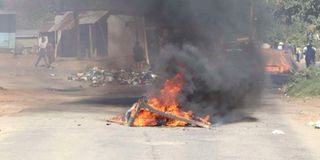Monarchy in Africa is dying

A barricade in the road that is on fire is seen in Mbabane, eSwatini, on June 29, 2021. Demonstrations have escalated radically as protesters demand immediate political reforms.
The Kingdom of Eswatini, formerly Swaziland, is restless. The absolute monarch, King Mswati III, has tasted what most of Africa went through in the early 1990s, when the citizens demanded, and got, multiparty democracy.
Eswatini’s youthful population are demanding changes in the way they are ruled. They want an elected prime minister with executive powers, as well as freedom of speech, among other demands.
With the most useful population in Africa at a median age of just 20.7, the king has either to give in and open up the country to democracy or prepare for endless protests. Most of the protesters were not born when political parties were banned in 1973.
The history of Eswatini’s administrative system of governance is interesting. From the times of King Sobhuza and his son Mswati, the forefathers of the current king, Eswatini has maintained a tradition that has baffled the world.
Parliamentary democracy
Unlike Britain, which has a parliamentary democracy under a constitutional monarchy in which the monarch is the head of state and the prime minister heads the government, Eswatini’s king wields absolute power in the appointment of cabinet ministers, judges and civil servants.
The queen mother, or Usibati, is highly respected. During King Sobhuza’s reign, the queen mother was superior to the king, though without real powers. Before Mswati III became king three decades ago, she was the regent as he was too young to rule.
Royalty among the Swazi today, as in the olden days, is meant to be a genuine binding force and is not a matter of sentiments. This is what the current youthful generation is protesting against.
For instance, at the annual umhlanga reed dance, the king’s wife-selection parade, girls dance topless. Mswati III already has 15 wives, who are highly maintained queens with huge budgets, yet 60 per cent of the population live below the poverty line.
Eswatini gained independence in 1968 but is yet to get democracy. A monarchy can no longer survive the turbulent waters of democratisation in Africa.





